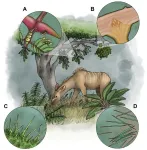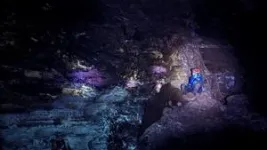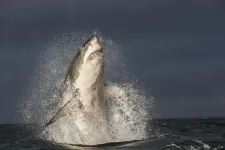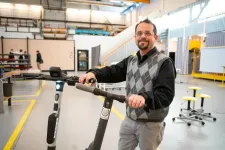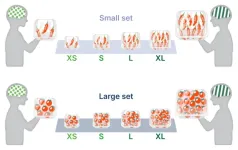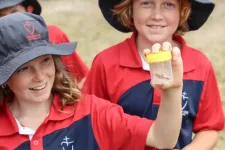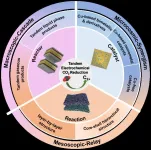(Press-News.org) A new published study reveals plants, fungi, bacteria, protists, and even some viruses deploy venom-like mechanisms, similar to that of venomous snakes, scorpions and spiders, according to researchers at Loma Linda University School of Medicine.
The definition of venom is a biological toxin introduced into the internal milieu of another organism through a delivery mechanism such as a sting or bite that inflicts a wound. According to lead author William K. Hayes, PhD, professor of biology for the Department of Earth and Biological Sciences at the School of Medicine, the findings show that reliance on venom for solving problems like predation, defense, and competition is far more widespread than previously recognized.
“Venomous animals have long fascinated biologists that were seeking to understand their deadly secretions and the traits associated with their use, but have also contributed numerous life-saving therapeutics,” Hayes said. “Until now, our understanding of venom, venom delivery systems, and venomous organisms has been based entirely on animals, which represents only a tiny fraction of the organisms from which we could search for meaningful tools and cures.”
According to the study, It’s a Small World After All: The Remarkable but Overlooked Diversity of Venomous Organisms, with Candidates Among Plants, Fungi, Protists, Bacteria, and Viruses, plants inject toxins into animals through spines, thorns, and stinging hairs, and some also co-exist with stinging ants by providing living spaces and food in exchange for protection. Even bacteria and viruses have evolved mechanisms, like secretion systems or contractile injection systems, to introduce toxins into their targets through host cells and wounds.
Hayes has a long history of researching venom in rattlesnakes, and began exploring a broader definition of venom over a decade ago while teaching special courses on the biology of venom. As he and his team were working on a paper to define what venom truly is, they found themselves encountering non-animal examples and decided to dig deeper to identify numerous examples that may have been overlooked.
This new study paves the way for new discoveries, and Hayes hopes it will encourage collaboration among specialists and scientists across disciplines to further explore how venom has evolved across diverse organisms.
“We’ve only scratched the surface in understanding the evolutionary pathways of venom divergence, which include gene duplication, co-option of existing genes, and natural selection,” said Hayes.
END
New research reveals venomous findings in non-animals
Animals share much in common with other life forms regarding their reliance on toxic secretions to solve critical problems such as predation, defense, and competition
2025-03-25
ELSE PRESS RELEASES FROM THIS DATE:
Ecosystem disrupted following the disappearance of Great white sharks, new study finds
2025-03-25
Ecosystem disrupted following the disappearance of Great white sharks, new study finds
Known for their powerful ability to launch out of the water in pursuit of prey, the loss of Great white sharks from False Bay in South Africa has scientists and conservationists concerned about the rippling effects on the ecosystem.
Miami, Florida – A new study published in the journal Frontiers in Marine Science, has uncovered evidence of far-reaching ecosystem consequences following the disappearance of Great white sharks (Carcharodon carcharias) from False Bay, South Africa. The research, conducted by scientists at the University of Miami Rosenstiel ...
New geometric design of material provides safer bicycle helmet
2025-03-25
By using new geometric shapes in the shock-absorbing material, researchers at the Universities of Gothenburg and Isfahan have developed a bicycle helmet that provides better protection against head injuries. The material absorbs shock by contracting bilaterally.
Bicycle helmets are important for protecting cyclists from head injuries, but traditional designs have limitations in terms of impact absorption and fit. Researchers at the University of Gothenburg and the University of Isfahan in Iran designed a bicycle helmet whose shock-absorbing ...
Why does one person develop schizophrenia while another does not? A leading psychiatric geneticist investigates the answer
2025-03-25
HOUSTON, Texas, USA, 25 March 2025 – Schizophrenia affects millions worldwide, yet its causes remain one of the greatest medical mysteries. In an exclusive Genomic Press Interview, Dr. Consuelo Walss-Bass, a pioneering researcher in psychiatric genetics, shares how both genetic predisposition and environmental factors contribute to severe mental health disorders. As the John S. Dunn Foundation Distinguished Chair in Psychiatry at UTHealth Houston, Dr. Walss-Bass has dedicated her career to understanding these mechanisms, transforming scientific discoveries into real-world applications ...
First joint oscillation analysis of super-kamiokande atmospheric and T2K accelerator neutrino data
2025-03-25
The Super-Kamiokande and T2K Collaborations present a joint measurement of neutrino oscillation parameters from their atmospheric and beam neutrino data. It uses a common interaction model for events overlapping in neutrino energy and correlated detector systematic uncertainties between the two datasets, which are found to be compatible. Using 3244.4 days of atmospheric data and a beam exposure of 19.7(16.3) x 1020 protons on target in (anti)neutrino mode, the analysis finds a 1.9???? exclusion ...
E-scooter crashes mainly caused by reckless driving
2025-03-25
Crashes on electric scooters are mostly due to the behaviour of the riders, with one-handed steering and riding in a group being some of the largest risk factors. The researchers are also concerned about riders who deliberately crash or cause dangerous situations when riding, a phenomenon that seems to be specific to electric scooters. This is shown by a study from Chalmers University of Technology in Sweden, which for the first time examines the causes behind crashes with electric scooters from naturalistic data within an urban environment.
The arrival of electric scooters in cities has meant an opportunity to quickly and smoothly make shorter trips. But not ...
Uncovering the brain’s flexible mechanisms for representing diverse numbers
2025-03-25
Abstract
The National Institute of Information and Communications Technology (NICT, President: TOKUDA Hideyuki, Ph.D.) has revealed, through fMRI-based brain activity analysis, that multiple regions in the human cerebral cortex flexibly represent numerical quantity. This finding comes from research by HAYASHI Masamichi (Researcher (Tenure-Track)) at Center for Information and Neural Networks (CiNet), part of NICT’s Advanced ICT Research Institute, in collaboration with the University of Tokyo’s graduate student KIDO Teruaki (NICT ...
Biological pathway in the brain could help explain why teenage girls are more depressed than boys
2025-03-25
Depression is a mental health condition that affects 280 million people worldwide. It is twice as common in women than men and this pattern starts to develop during adolescence. Researchers have studied the biological processes that drive depression in adults and shown a potential role for the kynurenine pathway, but this is the first time it has been investigated in adolescents in relation to biological sex.
The study was published in Biological Psychiatry and funded by MQ Mental Health Research and supported by the National Institute for Health and Care Research (NIHR) Maudsley Biomedical Research Centre (BRC).
The ‘kynurenine ...
Artisanal fishers are almost as accurate as satellites in producing environmental data
2025-03-25
Artisanal fishers can be almost as accurate as satellite data when it comes to their awareness of features that can be found in the marine environment, a new study has shown.
Published in the journal Ocean and Coastal Management, the research set out to establish the value of local ecological knowledge (LEK) and its ability to generate high quality habitat maps around five Greek islands in the eastern Aegean Sea.
Ten fishermen, based on their individual experience and knowledge, were asked to pinpoint areas where they believed seagrass beds could be found along the coastlines of their respective islands.
The maps they produced were then compared ...
Teaching kids about bugs benefits the environment
2025-03-25
Pro-environmental behaviour increases among school students who participate in insect-related citizen science projects, according to new research from the University of Adelaide.
Students who participated in citizen science project Insect Investigators, which engages students in the discovery of new insects, not only expressed an intention to change their personal behaviour but also to encourage others to protect nature.
“As a result of their involvement in this program, students expressed intentions to further engage in insect–science–nature activities,” says the University of Adelaide’s Dr Erinn Fagan-Jeffries, who contributed ...
Tandem design on electrocatalysts and reactors for electrochemical CO2 reduction
2025-03-25
Electrochemical CO2 reduction (ECR) driven by green electricity represents a promising strategy for CO2 mitigation and utilization by producing fuels and chemicals. Tandem strategy based on multifunctional tandem catalysts or cascade reactors enables deep CO2 reduction to high-value multi-carbon products. Nevertheless, it is challenging to precisely regulate the multi-step reaction pathways toward efficient CO2 conversion. A comprehensive understanding of the tandem reaction mechanisms is crucial for guiding the rational design of advanced catalysts and reactor systems to address these challenges.
This review systematically ...
LAST 30 PRESS RELEASES:
Novel camel antimicrobial peptides show promise against drug-resistant bacteria
Scientists discover why we know when to stop scratching an itch
A hidden reason inner ear cells die – and what it means for preventing hearing loss
Researchers discover how tuberculosis bacteria use a “stealth” mechanism to evade the immune system
New microscopy technique lets scientists see cells in unprecedented detail and color
Sometimes less is more: Scientists rethink how to pack medicine into tiny delivery capsules
Scientists build low-cost microscope to study living cells in zero gravity
The Biophysical Journal names Denis V. Titov the 2025 Paper of the Year-Early Career Investigator awardee
Scientists show how your body senses cold—and why menthol feels cool
Scientists deliver new molecule for getting DNA into cells
Study reveals insights about brain regions linked to OCD, informing potential treatments
Does ocean saltiness influence El Niño?
2026 Young Investigators: ONR celebrates new talent tackling warfighter challenges
Genetics help explain who gets the ‘telltale tingle’ from music, art and literature
Many Americans misunderstand medical aid in dying laws
Researchers publish landmark infectious disease study in ‘Science’
New NSF award supports innovative role-playing game approach to strengthening research security in academia
Kumar named to ACMA Emerging Leaders Program for 2026
AI language models could transform aquatic environmental risk assessment
New isotope tools reveal hidden pathways reshaping the global nitrogen cycle
Study reveals how antibiotic structure controls removal from water using biochar
Why chronic pain lasts longer in women: Immune cells offer clues
Toxic exposure creates epigenetic disease risk over 20 generations
More time spent on social media linked to steroid use intentions among boys and men
New study suggests a “kick it while it’s down” approach to cancer treatment could improve cure rates
Milken Institute, Ann Theodore Foundation launch new grant to support clinical trial for potential sarcoidosis treatment
New strategies boost effectiveness of CAR-NK therapy against cancer
Study: Adolescent cannabis use linked to doubling risk of psychotic and bipolar disorders
Invisible harms: drug-related deaths spike after hurricanes and tropical storms
Adolescent cannabis use and risk of psychotic, bipolar, depressive, and anxiety disorders
[Press-News.org] New research reveals venomous findings in non-animalsAnimals share much in common with other life forms regarding their reliance on toxic secretions to solve critical problems such as predation, defense, and competition
